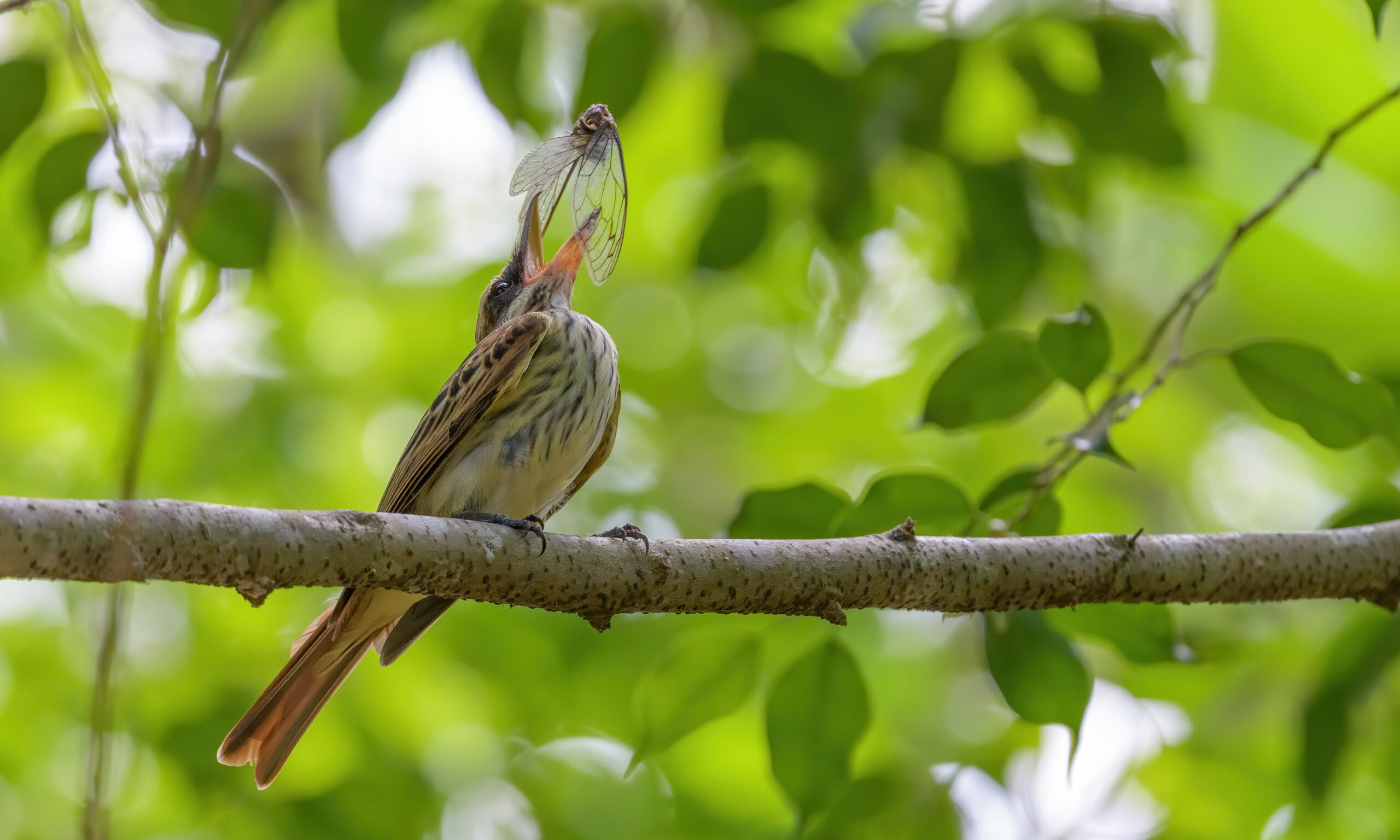As you hear a chorus of cicadas sounding off in the summer, you may ask yourself, “Do birds eat cicadas?” It seems like no matter how many species feed on these insects, they are always abundant during summertime.
Birds are known to incorporate dozens of different food sources into their diets, but do birds eat cicadas? If so, what birds eat cicadas? Continue reading as I discuss everything you want to know about birds and cicadas!
Table of Contents
Do Birds Eat Cicadas?
Cicadas are abundant during the summer when the adults try to mate. The peak of cicada activity coincides with the time that many birds are rearing their young – a time in which birds need to find plenty of food. So, do birds eat cicadas during this pivotal time of year?
Yes, many birds are known to eat cicadas. Cicadas are large insects that provide birds with a sizable, protein-rich meal. The ease with which cicadas can be consumed even prompts birds that don’t normally eat insects to enjoy the bounty of food.

Cicadas are a convenient, important food source for many bird species during the time in the summer when they prosper. Despite predation pressure from birds that eat cicadas and other animals, these creatures still manage to flourish and reproduce in sufficient numbers to persist into the future.
Now that we’ve confirmed that birds eat cicadas, let’s discuss–specifically–what birds eat cicadas.
What Birds Eat Cicadas? – 12 Bird Families That Eat Cicadas
Now that we know that the answer to the question, “Do birds eat cicadas?” is yes, let’s take a look at the species that devour these insects. What birds eat cicadas?
Crows, Ravens, and Jays
Crows, ravens, jays, and magpies are part of the corvid family. These birds are omnivorous and opportunistic, so they are happy to eat a wide variety of food sources. However, do crows eat cicadas?
Cicadas may certainly be on the menu for crows, ravens, and jays during summer when they’re plentiful. The impressive intellect of corvids means that cicadas cannot run or hide from these brainiacs.
Cuckoos
Cuckoos can be found throughout the world. They are sizable birds that eat a variety of invertebrates and small vertebrates in their diets. From the roadrunners in the desert to cuckoo species in the rainforest, these birds occupy a wide range of habitats.
No matter the ecosystem, there is a good chance that cicadas will be present among these birds. Cuckoos are birds that eat cicadas and take advantage of the abundance of these bugs during the cicada breeding season.
Falcons
Falcons are another group of raptors that enjoy a cicada snack. While large falcons such as Gyrfalcons and Peregrine Falcons are not likely to attack cicadas, smaller falcons such as kestrels would certainly consume such critters. The aerodynamic nature of falcons makes it easy for them to maneuver and catch cicadas on the wing.

Flycatchers
Adapted to capture insects on the wing, flycatchers are a cicada’s worst nightmare. Fortunately for cicadas, many flycatcher species are too small to consume an adult cicada, but larger species like kingbirds, Great Crested Flycatchers, Scissor-tailed Flycatchers, and more can readily dispatch a cicada.
Gulls
Most people don’t picture a gull when they think of a bird eating a cicada. While gulls are not insectivorous by nature, they are undeniably opportunistic feeders.
Gulls will take advantage of any available food source that they can find. This includes fish, garbage, food scraps, and yes – cicadas. Gulls will not fly into a tree to grab a cicada, but they will certainly pick one up off the ground or catch one on the wing.
Hawks
Cicadas are enjoyed by many birds, but do hawks eat cicadas too?
It should come as no surprise to know that hawks enjoy eating cicadas when given the chance. After all, they are found in the treetops where many hawks stalk their prey. While these diurnal predators would certainly prefer larger prey items, cicadas can make up a considerable part of many hawk species’ diets. Cicadas represent a low-effort, plentiful food option as they get consumed by hawks around the world.
Herons/Egrets
Herons and egrets may seem like another surprising bird family that consumes cicadas, but these birds are not about to pass up on bountiful numbers of cicadas when opportunities present themselves.
The heron family includes herons, egrets, and bitterns. These birds will consume just about anything that can fit into their mouths including fish, frogs, rodents, birds, and insects like cicadas. A cicada will quickly be snatched up if it finds itself near a waterway that is being patrolled by a heron.

Nightjars/Goatsuckers
These curious about which birds eat cicadas need not look any further than nightjars. Nightjars, otherwise known as goatsuckers, are a diverse group of nocturnal insectivores. They are typically not active in the day when cicadas are often singing but come nighttime, nightjars will awaken and go on the hunt for insects.
Cicadas are fair game for nightjars, as these birds have evolved to have massive gapes that can even capture small birds. A cicada that finds itself flying around in the darkness would be no match for a member of the nightjar family.
On the topic of nocturnal predators eating cicadas, some ask, “Do owls eat cicadas?”. Yes, owls do eat cicadas.
Sparrows
Sparrows are tiny birds that are known to devour seeds and grains, but do sparrows eat cicadas on occasion?
Those considering the question, “Do birds eat cicadas?” typically don’t think about sparrows as potential cicada predators. Although cicadas are large insects, they are nonetheless eaten by some sparrow species! Of course, certain sparrows are too tiny to eat cicadas. However, birds like the House Sparrow have hefty bills that allow them to eat insects like cicadas.
Cicadas never make up a large portion of a sparrow’s diet, but they are convenient snacks during the summer months. Moreover, sparrows can feed cicadas to their young to help them grow quickly.

Swallows
Swallows are aerial insectivores that feed strictly on flying insects. Being that cicadas are capable of flight, they may–indeed–find themselves on the menu for swallows.
Now, a cicada would be a substantial meal for many swallows because they’re big bugs while swallows are tiny songbirds. Indeed, even big swallows such as Purple Martins have a difficult time eating cicadas, and it is nearly impossible for Barn Swallows to consume these creatures.
Still, cicadas may become prey for ambitious swallows.
Tanagers
Tanagers are members of the cardinal family – a group of birds that includes cardinals, buntings, and grosbeaks. While all members of the cardinal family would be capable of eating cicadas thanks to their large bills, most of these species tend to prefer seeds instead of insects. Therefore, if someone asked, “Do cardinals eat cicadas?” then you could let them know that they typically do not.
Tanagers, on the other hand, love to consume insects in these forested domains. Tanagers are adept at navigating through the trees in pursuit of cicada quarry.
Woodpeckers
Woodpeckers spend a lot of time pecking at trees to find insects, but some wonder if they would settle for an easy meal such as a cicada. Do woodpeckers eat cicadas?
While adult cicadas are too large for many woodpecker species to subdue, cicada eggs and nymphs are perfect for woodpeckers to consume. Female cicadas lay their eggs in crevices within trees, making these eggs prime targets for woodpeckers.
When the nymphs are ready to transition into adults, they emerge from the ground and climb into trees where they begin to develop a hard exoskeleton. Cicadas are soft for a significant amount of time before they develop their exoskeletons. This makes them easy prey for woodpeckers.
Do All Birds Eat Cicadas?
I’ve now addressed a variety of birds that love to munch on cicadas. In fact, I’ve discussed so many birds that you may think that every bird must love cicadas. So, do all birds eat cicadas?
Alas, not all birds eat cicadas. It’s time to burst some bubbles and reveal birds that do not eat cicadas. Here’s a list:
- Do geese eat cicadas? No
- Do hummingbirds eat cicadas? No
- Do bluebirds eat cicadas? Cicadas are not typically part of bluebird diets
- Do pigeons eat cicadas? No
- Do doves eat cicadas? No
- Do ducks eat cicadas? Ducks rarely eat cicadas
- Do mockingbirds eat cicadas? Not typically
About Cicadas
Now that you know about birds that eat cicadas, you may want to know more about these insects.
Birds and cicadas are similar in some respects. They both fly around and sing to proclaim their territories and attract mates. However, the similarities end here.
Everyone has encountered a cicada at some point in their lives. A large, loud insect such as a cicada is certainly memorable for those who have laid eyes on one. Most people assume that cicadas are more or less the same throughout their distribution, but the truth is that the cicada family is incredibly diverse.

Many are surprised to realize that there are well over 3,000 species that exist across the globe.
Cicadas are often divided into two primary groups: the annual cicadas and the periodical cicadas. Annual cicadas are found worldwide and can be observed every year in the summertime. Periodical cicadas are only located in North America. These insects synchronize their emergence so that vast numbers appear in late spring every 13 or 17 years.
Cicadas are often associated with the loud buzzing noise that they produce during the summer. The males are the only individuals producing this noise, as it is a mating signal used to attract other cicadas to their location.
When a male and female mate, the male soon dies and the female lays eggs to start the cycle over once again. The juveniles—or nymphs—live in the ground until it is their time to become an adult.
Conclusion
Now, that you’ve read this article, you should have a much better idea of what eats a cicada.
Do birds eat cicadas? We now know that the answer to that question is yes – many species of birds enjoy a cicada snack. Cicadas are abundant during the summer throughout the world. No matter how you feel about these flying insects, you can be confident that birds in your area would love to eat cicadas whenever they get the chance.
To summarize:
- Do birds eat cicadas? Yes, many species eat cicadas
- What birds eat cicadas? Everything from falcons to flycatchers eats cicadas, but not all birds eat cicadas
- Do hawks eat cicadas? Yes
- Do woodpeckers eat cicadas? Yes

